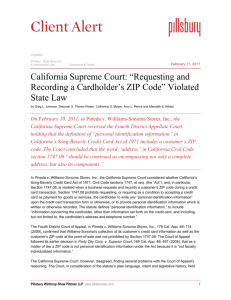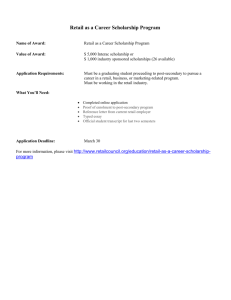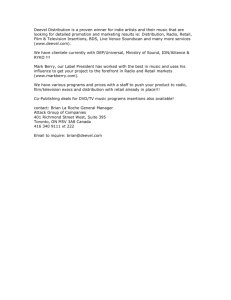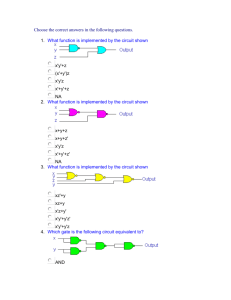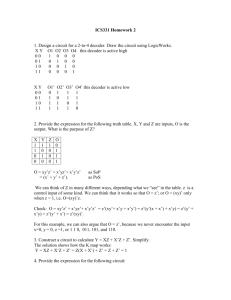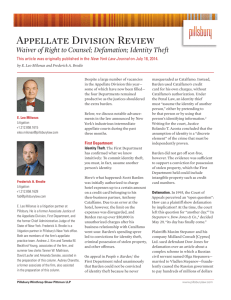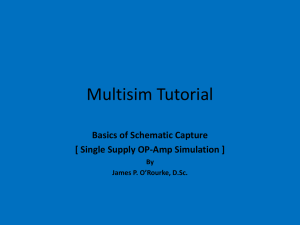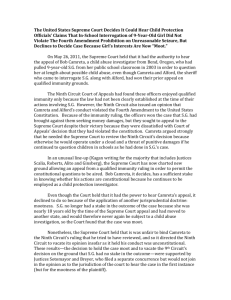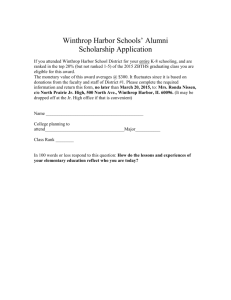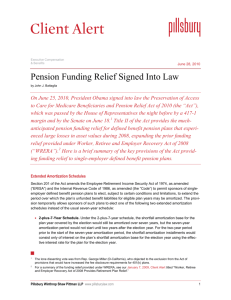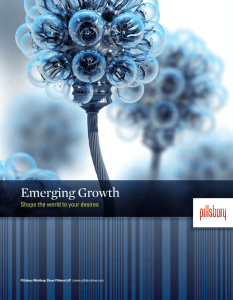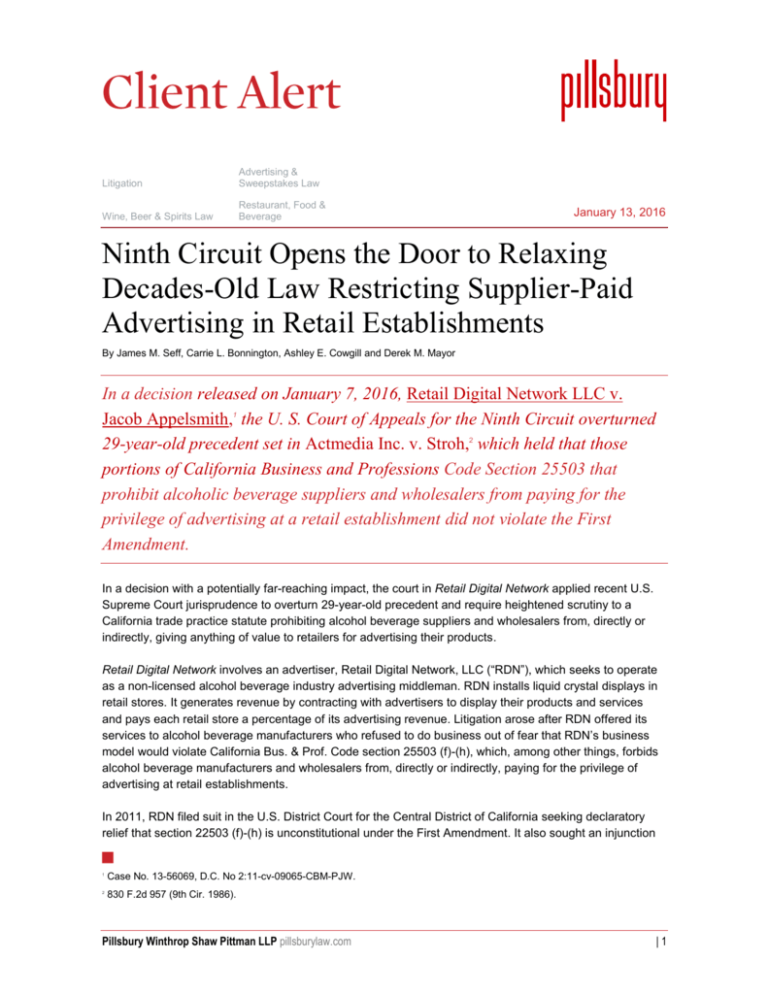
Client Alert
Wine, Beer & Spirits Law
Litigation
Advertising &
Sweepstakes Law
Wine, Beer & Spirits Law
Restaurant, Food &
Beverage
January 13, 2016
Ninth Circuit Opens the Door to Relaxing
Decades-Old Law Restricting Supplier-Paid
Advertising in Retail Establishments
By James M. Seff, Carrie L. Bonnington, Ashley E. Cowgill and Derek M. Mayor
In a decision released on January 7, 2016, Retail Digital Network LLC v.
Jacob Appelsmith,1 the U. S. Court of Appeals for the Ninth Circuit overturned
29-year-old precedent set in Actmedia Inc. v. Stroh,2 which held that those
portions of California Business and Professions Code Section 25503 that
prohibit alcoholic beverage suppliers and wholesalers from paying for the
privilege of advertising at a retail establishment did not violate the First
Amendment.
In a decision with a potentially far-reaching impact, the court in Retail Digital Network applied recent U.S.
Supreme Court jurisprudence to overturn 29-year-old precedent and require heightened scrutiny to a
California trade practice statute prohibiting alcohol beverage suppliers and wholesalers from, directly or
indirectly, giving anything of value to retailers for advertising their products.
Retail Digital Network involves an advertiser, Retail Digital Network, LLC (“RDN”), which seeks to operate
as a non-licensed alcohol beverage industry advertising middleman. RDN installs liquid crystal displays in
retail stores. It generates revenue by contracting with advertisers to display their products and services
and pays each retail store a percentage of its advertising revenue. Litigation arose after RDN offered its
services to alcohol beverage manufacturers who refused to do business out of fear that RDN’s business
model would violate California Bus. & Prof. Code section 25503 (f)-(h), which, among other things, forbids
alcohol beverage manufacturers and wholesalers from, directly or indirectly, paying for the privilege of
advertising at retail establishments.
In 2011, RDN filed suit in the U.S. District Court for the Central District of California seeking declaratory
relief that section 22503 (f)-(h) is unconstitutional under the First Amendment. It also sought an injunction
1
Case No. 13-56069, D.C. No 2:11-cv-09065-CBM-PJW.
2
830 F.2d 957 (9th Cir. 1986).
Pillsbury Winthrop Shaw Pittman LLP pillsburylaw.com
|1
Client Alert
Wine, Beer & Spirits Law
against the State’s enforcement of the law. The State moved for summary judgement which the District
Court granted pursuant to Actmedia, Inc. v. Stroh. Actmedia previously upheld section 25503 as consistent
with the First Amendment after applying intermediate scrutiny to laws burdening commercial speech
pursuant to Central Hudson Gas & Electric Corp. v. Public Service Commission N.Y., 447 U.S. 557 (1980).3
RDN appealed, and on January 7, 2016, the Ninth Circuit reversed and remanded. In Retail Digital
Network, the Ninth Circuit held that Actmedia is irreconcilable with a trio of subsequent Supreme Court
decisions including Rubin v. Coors Brewing Co., 514 U.S. 476 (1995), 44 Liquormart, Inc. v. Rhode Island,
517 U.S. 484 (1996) (plurality opinion), and, most importantly, Sorrell v. IMS Health, Inc., 131 S. Ct. 2653
(2011). Sorrell modified the Central Hudson test by including a threshold inquiry into whether a challenged
law that burdens non-misleading commercial speech about legal goods or services is content- or speakerbased. If it is, the challenged law is subject to heightened, rather than intermediate, scrutiny. Under
heightened scrutiny, pursuant to Sorrell, Central Hudson remains the appropriate analytical framework but
the government bears the burden of showing “that the harms it recites are real and that its restriction will in
fact alleviate them to a material degree”4 and that the challenged law “is drawn to achieve [the
government’s substantial] interest.”5 Because section 25503(f)-(h) is a content-based restriction on nonmisleading commercial speech regarding a lawful good or service, the Ninth Circuit held that law must be
subject to heightened scrutiny. Accordingly, the Ninth Circuit remanded on an open record for the District
Court to apply heightened judicial scrutiny and determine, among other things, whether the government
“has shown that there is a real danger that paid advertising of alcoholic beverages would lead to vertical or
horizontal integration under circumstances existing in the alcoholic beverage market today,” 6 and, “whether
the State has shown that section 25503(f)–(h) materially advances the State’s goals of preventing vertical
and horizontal integration and promoting temperance.”7
Importantly, the Ninth Circuit expressed grave “skepticism regarding whether section 25503(f)–(h)’s burden
on expression directly advances and is fit to achieve a permissible goal” of promoting temperance.8
Assuming the Ninth Circuit does not grant rehearing en banc, or that in the interim the State does not file a
petition for certiorari with the U.S. Supreme Court, we must wait to see how the District Court will ultimately
decide the constitutionality of section 25503(f)–(h) on remand. But the trial court must heed the Ninth
Circuit’s admonitions, and the decision on remand very well may open the door to aligning modern
methods of alcohol beverage advertising with 21st century commerce, at least within the Ninth Circuit.
3
The Central Hudson test asks: (1) whether the speech at issue concerns lawful activity and is not misleading; (2) whether the
asserted government interest is substantial; and, if so, (3) whether the regulation directly advances the governmental interest
asserted; and (4) whether it is not more extensive than is necessary to serve that interest. Central Hudson, 447 U.S. at 566.
4
Retail Digital Network, at *17 (citing Rubin v. Coors Brewing Co., 514 U.S. 476, 487 (1995)).
5
Id. (citing Sorrell, 131 S. Ct. at 2667-68).
6
Id., at *25.
7
Id.
8
Id., at *24, 25-26, 26-27.
Pillsbury Winthrop Shaw Pittman LLP pillsburylaw.com
|2
Client Alert
Wine, Beer & Spirits Law
If you have any questions about the content of this alert please contact the Pillsbury attorney with whom
you regularly work or the authors below.
James M. Seff (bio)
San Francisco
+1.415.983.7441
james.seff@pillsburylaw.com
Carrie L. Bonnington (bio)
Sacramento
+1.916.329.4735
carrie.bonnington@pillsburylaw.com
Ashley E. Cowgill (bio)
Nashville
+1.615.622.3708
ashley.cowgill@pillsburylaw.com
Derek M. Mayor (bio)
Sacramento
+1.916.329.4703
derek.mayor@pillsburylaw.com
About Pillsbury Winthrop Shaw Pittman LLP
Pillsbury is a full-service law firm with an industry focus on energy & natural resources, financial services
including financial institutions, real estate & construction, and technology. Based in the world’s major
financial, technology and energy centers, Pillsbury counsels clients on global business, regulatory and
litigation matters. We work in multidisciplinary teams that allow us to understand our clients’ objectives,
anticipate trends, and bring a 360-degree perspective to complex business and legal issues—helping
clients to take greater advantage of new opportunities, meet and exceed their objectives, and better
mitigate risk. This collaborative work style helps produce the results our clients seek.
This publication is issued periodically to keep Pillsbury Winthrop Shaw Pittman LLP clients and other interested parties
informed of current legal developments that may affect or otherwise be of interest to them. The comments contained herein
do not constitute legal opinion and should not be regarded as a substitute for legal advice.
© 2016 Pillsbury Winthrop Shaw Pittman LLP. All Rights Reserved.
Pillsbury Winthrop Shaw Pittman LLP pillsburylaw.com
|3

